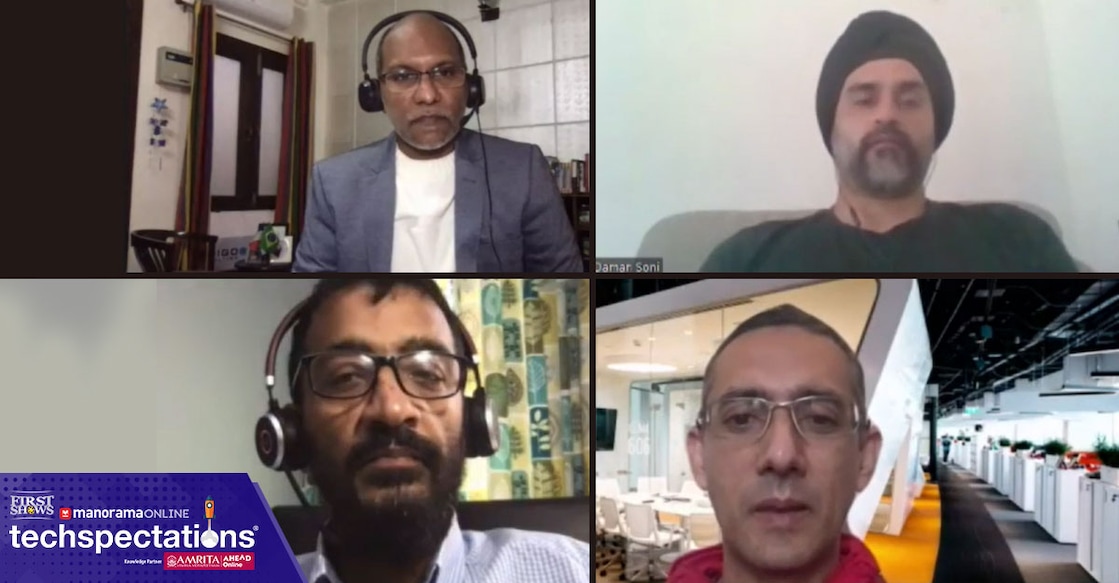Techspectations 2020 | How COVID will change the very fabric of marketing

Mail This Article
The ability to shed old ways and embrace the new has always been the cornerstone of any successful marketing campaign.
But 2020 is no ordinary year. Wreaked first by the coronavirus pandemic raging across the world and the stifling of economy, the year has been a turbulent one.
Marketing executives everywhere have snaked down their chairs and are jostling for space underneath the table alongside financial forecasters and crystal-gazers.
Nobody can foretell the future. But as Google India's Sanjay Gupta said during the keynote address of Techspectations 2020, it's how fast you adopt that makes all the difference.
The discussion on Changing perspective of Marketing for brands & business at Techspectations 2020, Manorama Online's two-day digital summit, delved on the sweeping changes in marketing.
The panellists were Vishal Kapil - CTO, Fashion & Lifestyle Retailer; Unny Radhakrishnan - CEO, Digitas India; Damandeep Singh Soni - Vice-President, Growth, boAt; Jose Leon - Chief Operating Officer, Indigo Consulting and Publicis Groupe.
The longer the pandemic stays, the more likely that it is going to leave behind remnants, Vishal Kapil said.

“Consumer behaviour is certain to change. In fact, the changes are felt already - one need only look at one's Amazon's order history for the last six months to learn this,” he said.
With no customers coming into stores during the lockdown, businesses everywhere have had to revamp quickly to stay afloat. Marketing too had to following suit and evolve in unprecedented ways, he pointed out.
Kapil noted that the big changes reshaping the industry now had been in the works for a while and that COVID was only a catalyst that hastened the process.
“It is the mushrooming of new platforms to connect and consume content that's largely responsible for this swing,” Kapil said.
“How you interact and influence your consumer is of pivotal importance,” he added.
Kapil talked about how a stationery shop in his neighbourhood had become online in the past few months. “It is all about integration, how you connect with consumers,” he added.
This new shift has also put a lot of pressure on the operation model, Kapil concedes.
“It requires new structure, new training, specialists for the role. Marketing function has to do a complete overhaul. Tech guys like myself enjoy this moment. This is the age of MarTech (Marketing Technology),” he said.
Unny Radhakrishnan, the CEO of Digitas India who has 25 years of experience melding technology and marketing, stressed on the three levels of changes that are taking shape.

“New behaviour is creating new products and services. Online education is a good example of this, the wide-acceptance of digital payments is another. There are also microservices that are getting popular – paid newsletters, paid podcasts, paid mentorship.
Brands are also getting into adjacent areas of business. One of the best examples here is Swiggy getting into grocery delivery. The hurdles for this are little or none. And geographical limitations in digital age is never a problem,” Radhakrishnan said.
“The second is new ways of service delivery and the impact it has on marketing operations. When digital is your primary touch point, it calls for specialists who can collect ande decipher the large data it spawns.
A lot of marketing options too would have been automated,” he said.
“Thirdly, digital advertising. The scale and speech at which things are moving are so unprecedented that there is no longer time to ponder and strategize. Brands today are creating ambassadors out of consumers to influence the masses. You could call it a democratisation of celebrity culture,” Radhakrishnan said.
The challenge that will arise here, Radhakrishnan warned, is the consolidation of power with a few top tech companies. “Whoever controls distribution and data will get to the top.”
Damandeep Singh Soni, the man responsible for boAt becoming the 500-million user company that it is today, said startups, though minions of the marketing world, are able to compete with the heavyweights because of everything digital.

He also pointed out that the role of the Chief Marketing Officer has evolved to encompass a wider range of fields including technology. But he warned against making the mistake of thinking that pouring money into MarTech solves everything.
“Story matter. Your consideration matters. Getting insights from your consumers is key. The first-party research, which predominantly dictated how marketing was done before, is missing now. The only feedback today is through customer calls,” he said.
He also stressed on the gravity of the threat posed by coronavirus pandemic and the changes that it may leave in its wake. “Retention cannot be your cool “have-it-for-fun” word any more. Retention is serious now. It is the new acquisition.”
Jose Leon, the Chief Operating Officer at Indigo Consulting and Publicis Groupe, talked about how companies operated on account of the pandemic.

“There are three phases. Respond phase where brands ensured business continuity and employee welness; Recover phase where they settled down to sketch recovery roadmaps; and thrive phase, where they geared up for the new normal soaking in all that they have learned by way of data and market research.”
“COVID is both an opportunity and a challenge,” Leon said. “It has brought the unification of data, the bridging of the path of purchase. The difference going forward will be how brands retain trust, how they influence and interact with their consumers.”
All the experts dismissed the idea the brick and mortar stores will be no more. They stressed that while those stores will still remain, digital transactions would become the most preferred option.

